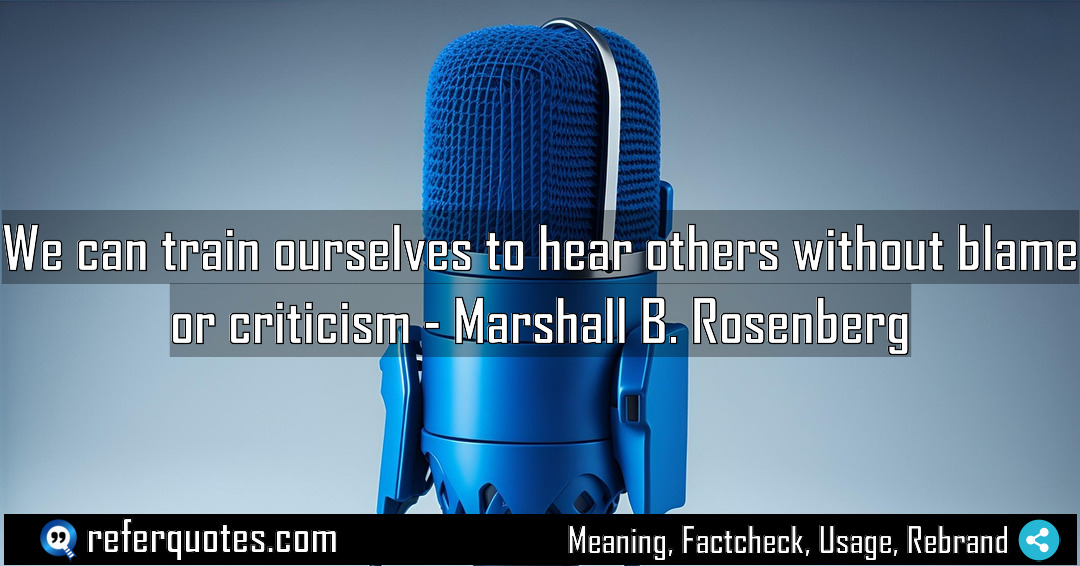
We can train ourselves to hear others without blame is a powerful shift from passive reaction to active, empathetic skill-building. It reframes listening as a discipline we cultivate, not just a trait we’re born with. This moves the focus from judging others to mastering our own internal responses.
Share Image Quote:
Table of Contents
Meaning
At its core, this is about shifting from a habit of evaluating what someone says to a practice of understanding what they feel and need.
Explanation
Let’s be real, our default setting is to listen through a filter of judgment. Someone says something, and our mind instantly starts drafting a rebuttal, assigning blame, or criticizing their character. Rosenberg’s genius was in pointing out that this isn’t a fixed personality flaw—it’s a trainable habit. Think of it like a muscle. The muscle of empathetic presence. When you truly hear someone without the static of blame, you’re not agreeing with them. You’re simply giving them the profound gift of being seen and heard. And that, in my experience, is where real connection and problem-solving actually begin. It completely changes the game.
Quote Summary
Reading Level70
Aesthetic Score65
Origin & Factcheck
This quote comes straight from Marshall B. Rosenberg’s seminal work, Nonviolent Communication: A Language of Life, first published in the United States in 1999. It’s a cornerstone of the NVC model he developed, so you won’t find it accurately attributed to anyone else.
Attribution Summary
Where is this quotation located?
| Quotation | We can train ourselves to hear others without blame or criticism |
| Book Details | Publication Year: 1999; ISBN: 9781892005038; Last edition: 3rd Edition (2015); Number of pages: 264. |
| Where is it? | Chapter 7: Receiving Empathically, Page 124 (2015 edition) |
Context
In the book, this idea isn’t presented as a nice sentiment. It’s a practical tool. It sits within the framework of the four components of NVC: Observations, Feelings, Needs, and Requests. “Hearing without blame” is the active practice of receiving someone’s message and translating it into those core human needs, which completely bypasses the drama and defensiveness.
Usage Examples
So, how does this look in the wild? It’s for anyone who has to talk to other humans, honestly.
- For a Manager: An employee misses a deadline. Instead of thinking “They’re so irresponsible,” you train yourself to hear their explanation and wonder, “What need wasn’t met? Was it support? Clarity? Resources?” This leads to solutions, not resentment.
- In a Relationship: Your partner says, “You’re always working.” The untrained ear hears criticism and gets defensive. The trained ear hears, “I have a need for connection and companionship that isn’t being met.” The entire conversation shifts.
- For Parents: Your child yells, “I hate you!” The blame/criticism filter says they’re being disrespectful. The NVC filter hears a child overwhelmed by feelings and unmet needs (for autonomy, understanding, etc.), allowing you to respond with empathy instead of anger.
To whom it appeals?
Share This Quote Image & Motivate
Motivation Score75
Popularity Score75
Shareability Score70
FAQ
Question: Does hearing without blame mean I have to agree with the other person?
Answer: Absolutely not. This is the biggest misconception. It’s about understanding their perspective and the feelings/needs behind it. You can fully understand why someone is upset and still disagree with their actions. Understanding is not capitulation.
Question: How do you actually “train” yourself to do this? It sounds hard.
Answer: It is hard at first! It’s a re-wiring. Start small. In a low-stakes conversation, just practice pressing the mental pause button when you feel blame arising. Silently ask yourself: “What might they be feeling? What need are they trying to meet?” That simple question is the rep that builds the muscle.
Question: What if the other person is genuinely at fault and criticizing me unfairly?
Answer: This is where it becomes superpower. When you hear their criticism not as a truth about you, but as an expression of *their* unmet need, their words lose the power to hook you. You stop playing defense and can actually address the root issue. It’s incredibly empowering.
Similar Quotes
You can’t make people listen; you can only make something worth listening to. It’s a game-changing shift from shouting louder to creating something so compelling people lean in. This is…
When we combine observation with evaluation, we’re basically handing people a reason to get defensive. It’s one of those communication traps that seems logical but backfires constantly. This simple insight…
You teach others how to treat you every time… it’s a powerful truth. It means your daily interactions, both spoken and unspoken, actively shape your relationships and the respect you…
You know, the more we are willing to hear the pain, the less we get caught up in our own defensive reactions. It’s a game-changer for communication, honestly. This insight…
You know, the more we hear the feelings… it completely changes how we handle tough conversations. It’s like putting on armor made of understanding. This shifts the entire dynamic from…
